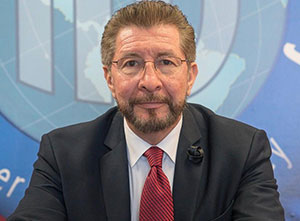Dictatorships get installed when there is treason by the opposition and the domestic business owners

By: Carlos Sánchez Berzaín - 17/03/2023
Share:
The 21st century, originally expected to be one with widespread democracy in the Americas, has turned out to be one with the expansion of dictatorships. Cuba’s dictatorship that was wasting away with its “special period” in the last decade of the past century, has expanded its organized crime’s system to Venezuela, Bolivia, and Nicaragua, and continues its conspiracy throughout the region. Even with the control of governments in democratic countries, however, it has not crushed democracy because dictatorships get established when there is treason from the opposition and domestic business owners.
While the “Interamerican Democratic Charter” (IDC) was being signed in Lima, Peru on 11 September of 2001, an unprecedented terrorist attack was taking place in United States’ territory. The Interamerican Democratic Charter, a foundational treaty signaled the institutionalization of democracy as “the right of the peoples of the Americas that governments have the obligation to promote and defend”. The terrorist attacks forebode radical changes in United States’ foreign policy that left our entire region open for the expansion of dictatorships.
Twenty-First Century Socialism, with unlimited resources, under the public leadership of Hugo Chavez who had subordinated Fidel Castro, founded with the Cuban dictatorship’s structure of intelligence and operations that blood-stained the region for the past 40 years, with the Forum of Sao Paolo as an instrument at its service, with an antiimperialist discourse and populist proposals, faced democratic governments harassed for meeting economic objectives imposed on them, destabilized the democratic system, toppled governments, created crises, and took over those governments.
Bolivarian populism evolved into 21st Century Socialism, or Castrochavism, and with the very timely and opportune death of Hugo Chavez, Cuba took the much-envied leadership that was previously bothered by, and Venezuela went from being the leader and owner of the resources, to be the main colony. The leadership of Latin America in the 21st century was carried out by Hugo Chavez and following his death it passed to Cuba’s dictators. This is how the axis of confrontation of dictatorship against democracy were clearly identified, a confrontation that would be globally unveiled with Russia’s invasion to Ukraine.
The Interamerican Democratic Charter had been expected to be the start of “widespread democracy” but, contradictorily, it signaled the beginning of the worst times for democracy in the Americas, starting with Castrochavism’s control of the Organization of American States (OAS) under Secretary Insulza, a period in which essential components of democracy were ignored, violations of human rights were covered up, the existence of political prisoners and exiles was overlooked, and democracy was subordinated to moneys originating from the emptying of Venezuela’s coffers or from corruption with Brazil’s federal funds or Lula’s lava jato scheme, and the advent of narco-States that Cuba, Venezuela, Bolivia, and Nicaragua came to be.
In this perilous scenario, Castrochavism was able to control practically all governments of Latin America but was only able to establish dictatorships in Venezuela, Bolivia, Nicaragua, and Ecuador, the latter redeemed by Lenin Moreno. It controlled Argentina with the Kirchner’s and now again with Fernandez, but was -thus far- unable to breakup democracy there. It also controlled the governments of; Paraguay with Lugo, Uruguay with Mujica but they accepted alternance and delivered the government and democracy continues there. In Chile, Bachelet completed her term and now they have Boric there, still unable to break up their institutionality. In Brazil; Lula, Rousseff served terms, and now Lula is again is serving another term and democracy resists there. Castrochavism is also in Colombia with Petro and in Mexico with Lopez Obrador. Central America and the Caribbean show the same situation.
Countries where Castrochavism established dictatorships are those in which the political opposition made “arrangements of understanding to break up the democratic institutionality” allowing the existence of Constitutional Assemblies, falsifying reforms and mechanisms that progressively and irreversibly grant the total control of power. In Nicaragua it was Aleman and others in exchange for impunity, in Bolivia it was Mesa, Quiroga, Doria-Medina, Ortiz . . . with commercial deals, in Venezuela . . . there are so many and so well-known by Venezuelans . . . Once dictatorships get installed, all deliverers of democracy are the “functional opposition.”
After political treason, that of domestic business owners ensued when they juggled to have important and lucrative deals with the regime that included the elimination of the “free press” through the sale or confiscation of the news media. They were partners for the elimination of journalism willing to investigate and report the wrongs of the government that had jail or exile as its last destination.
There are a majority of societies that have defeated and are defeating the dictatorships’ attacks. They are doing it today in Peru, Colombia, Mexico, again in Argentina, Chile, Ecuador, and Brazil. There are oppositions that do not sell out either their principles, or the democratic institutionality, business owners who do not prefer opportunistic deals to the free market demand, and journalists who with similar conditions can continue to be the last trench for freedom facing transnational organized crime.
*Attorney & Political Scientist. Director of the Interamerican Institute for Democracy.
Translation from Spanish by Edgar L. Terrazas
«The opinions published herein are the sole responsibility of its author».